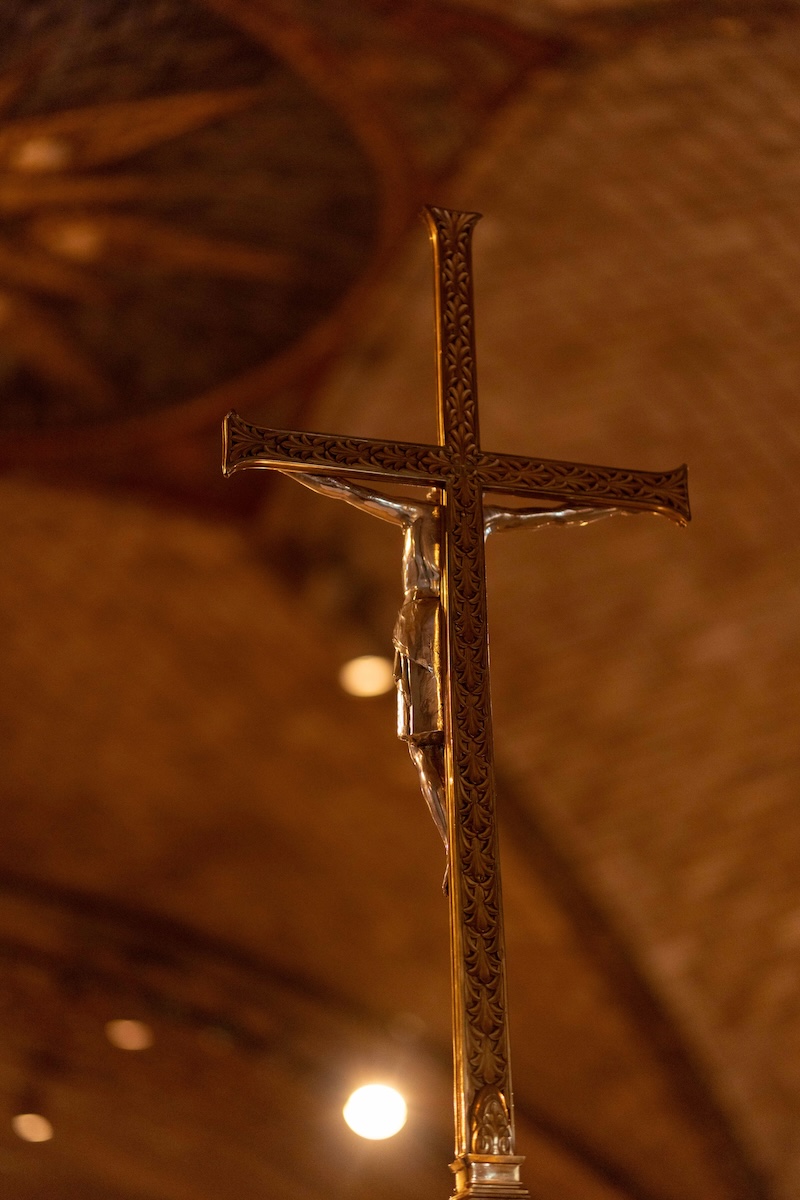As Catholic fathers, we properly have a foot in this temporal world with all its many responsibilities, and a foot in the spiritual realm with its concerns for truth, salvation, and eternal life. One is passing; the other is eternal. Yet, as a Catholic, we know that both are related. What we do in this temporal life determines how we will live eternally in the world to come.
By What Vision
Proverbs 29:18 tells us that“without a vision, the people perish.”That means we have the capacity and the responsibility to choose the vision, the path, by which we live our lives. Whether conscious of it or not, everyone has a framework of values that determines how they make decisions and guides their lives. To choose to live by God’s revelation is to have His “vision” of reality and know the way leading to eternal life. Alternately, if we live without any understanding of the reality of Christ, then we will inevitably become captive to the ideologies of our current age and they will become the vision that determines our life decisions. St. Paul encouraged Christians to“let this mind be in you which was also in Christ Jesus”(Phil 2: 4). The truth is that our minds cannot tolerate a vacuum; we will either live by God’s truths or by the values of the fallen world.
Currently, our world sees a fulfilling sexual experience as an absolute human right, in and of itself. Hence, Christian marriage, because it has boundaries, is often considered to be oppressive and must be broadened to include every type of sexual partner and activity while marriage, itself, must not have any sense of permanent endurance. In modern thought, marriage is merely a human contract that can be dissolved by either party for any reason and is not essential to sexual expression or human reproduction.
The Christian Vision
The Christian “vision” is totally different. In Gen 2, we see that man is not an autonomous, self-determining agent. The human person is created by God and made in His image, which includes his sexuality. In Gen 1:24, gender in the human person is mentioned but is related to the image of God. “In the image of God, He created him; male and female He created them.” Clearly, human sexuality is not a social construct, proposed by man for social cohesion. Nor is it self-determined. The gendered bodiliness of the human person, by design, possesses theological and spiritual depths.
We see this particularly in Genesis which answers the question: what is the precise relationship between man and woman? This text is about the one-flesh union between man and woman but gives the answer within the context of God’s covenant and presenting Eden as the first Temple. All this speaks to the fact that marriage (and, therefore, family) is tied to God’s plan of salvation. In other words, marriage and family are intrinsically linked to God’s working out our salvation in Christ Jesus. This is a big claim but is further confirmed by St. Paul in Eph 5: 21-33. In this epistle, Paul talks extensively about the salvation in Christ and then pivots to the relationship between husband and wife. He concludes by referring back to the creation narrative (see Gen 2:24) where man and woman become one flesh.

Marriage as a Reality of the Cross
At this point, Paul shows how human marriage – and thereby family – is actually grounded in and meant to participate in Jesus’ love for the Church. Having concluded with the one-flesh union of man and woman, Paul reveals: “This is a great mystery: but I speak concerning Christ and the church” (Eph 5:32).
Marriage, and how we live it, flows from the life of Christ poured out from the Cross. To the degree that we are faithful to the nature God has given marriage, we become conduits of Christ’s saving grace to each other.[i]
When two baptized people marry, their marriage bond becomes a means of sacramental grace, and marriage becomes a sacramental reality. But this also expands to the fruit of the marriage as well. The family that is baptized in Christ now becomes the place, like the Church, Herself, where the Holy Spirit is uniquely present, actively bringing about the salvation of its members. Because of this, the family in Christ is an extension of the Church and is, by its nature, a “domestic church.”[ii]

Fatherhood as an Ecclesial Role
It is from this vision of marriage and the family that the proper role of the father flows. If the family possesses an ecclesial character, then the father of a Christian family serves in an ecclesial role. Augustine said that the father is like the bishop in his own family. He, along with Chrysostom, taught that the father is particularly responsible for the spiritual development of his own wife and children. The father was to make sure the family knew the Scriptures, to keep all influence of heresy from their home, and to create a loving order in the home. It should be noted that responsibility always requires authority and that all authority is derived from God. Fathers, to be faithful to God’s design, can only exercise their fatherly authority in a loving and sacrificial manner to be authentic and to reflect the servant attitude of Christ.

Education in the Domestic Church
John Paul II greatly developed the idea of the family as the domestic church and this was later incorporated into the Catholic Catechism. One key point he made was the need to understand that the role of education in the family is not bestowed by the government, but is essential to, and rooted in the nature of marriage, itself.[i] JPII wrote: “Parents must be acknowledged as the first and foremost educators of their children. Their role as educators is so decisive that scarcely anything can compensate for their failure in it.” Because this role of education is grounded in the love of the mother and father, JPII concludes: “It is irreplaceable and inalienable, and therefore incapable of being entirely delegated to others or usurped by others.” [ii]
Father as Bishop
For Augustine and Chrysostom, the father has a bishop-like role and is responsible for the teaching of his “little flock.” He is to protect the whole family from false teachings and all that would lead family members away from the faith. “The father “admonishes, teaches, exhorts, rebukes, uses benevolence, and exercises discipline for all who belong to him.”[iii]
Consequently, Augustine writes, “The job of bishoping ought to apply to him [the father], how his people believe, seeing none of them drift into heresy, … keep a very watchful eye over the welfare and salvation of all your household.”[iv]
Chrysostom, similarly, writes: “Indeed, the man should repeat those things which are appointed [i.e., the Scriptures]; the wife, moreover, should learn thoroughly, the children should listen, nor should the servants be defrauded of these readings. Make your home a church. Indeed, the salvation (welfare) of both your children and your servants (must be rendered by you).”[v]
The father is responsible for the education, i.e., the formation of his children as beings, created in the image of God. He is to help them develop fully into the person God created them to be. This includes the physical, psychological, and spiritual dimensions of the human personality.
Contrary to the world’s dystopian vision of reality, man, and woman, because of their created nature (i.e., given natures), have differing roles in marriage and the family. JPII clearly shows that men’s unique charism is “in revealing and in reliving on earth the very fatherhood of God.” Like the caring heavenly Father, earthly fathers are to lead, provide, discipline, and protect their families in loving and self-sacrificing ways. They are to lead and teach their children how to become fully human and fully alive in Christ.
[i] Remember, Jesus explained to the Pharisees that He had come to restore marriage as it was in the beginning (Matt 19).
[ii] In its document on the Church, Vatican II recovered the truth that the family is like a domestic church.[ii] CCC 777 teaches that the smallest cell of the Church was not the parish but the family.
[iii] Note: Generation and education of children
[v] Augustine, In Joannis Evengelium, Tr. 51, 13 (PL 35, 1768)
[vi] Augustine, Sermo 96, 7, 9 (PL 38, 588)
[vii] Chrysostom, In Genesim Sermo 7 (PG 54, 607)
